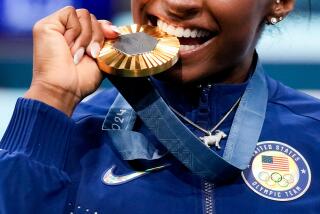Shea Preparing for ’06 Winter Games
LAKE PLACID, N.Y. — Jimmy Shea is spending a lot of his time cruising Lake Placid in his vintage mahogany speedboat, dubbed “Happy Ending” after his Olympic gold medal in skeleton three years ago.
“It’s my dream boat. It’s classic, all redone,” Shea said of his 1952 Century, its stern emblazoned with the Olympic rings. “It’s beautiful.”
If only he could say the same about his sliding career.
With the Turin Olympics less than seven months away, Shea no longer is the poster boy for the sport he almost single-handedly pushed back onto the Winter Olympic scene for the first time in more than 50 years.
Nine months after his stunning Olympic victory at Salt Lake City in 2002, Shea underwent surgery to restore the blood flow in his left leg and did not compete for a year. He returned to the ice in 2003-04 and finished eighth overall in World Cup, then chose not to compete in World Cup this past season.
“I’d been doing it for nine years. I needed a break,” Shea said. “I got a dog, fixed up a little town house, and got my head back on my shoulders.”
Now, Shea hopes his slide into relative obscurity is near an end.
The back of his left leg bears the massive scar of a six-hour operation in which surgeons cut the back of his calf all the way up to the middle of his thigh, removed several cysts, then used more than 400 stitches to close the incision.
But adding another chapter to his family’s remarkable Olympic legacy is foremost on the mind of the third-generation Olympian, and his Olympic dream has been rekindled.
“It’s up to me. It’s just a matter of whether I can still do it or not,” said Shea, who turned 37 in June and is back running sprints and lifting weights at the Olympic Training Center. “I love to compete, it’s kind of my nature. I’m ready to really gut it out. I’m doing everything I can to get myself in the best shape I can and be ready. The leg is still giving me some problems, but I’m working through it.”
Shea’s decision to try one more time was welcome news for the family.
“He does have quite a bit to prove, that he can do what it takes,” said Jim Shea Sr. “I’d love to see him make another Olympic team. I know if he makes it, he’ll be a real contender. But there’s pressure. The young kids are fast today, and he’s not getting any younger.”
Jimmy Shea caught the attention of the International Olympic Committee after his surprising victory at the 1999 Skeleton World Championships in Altenberg, Germany, the only American slider to accomplish that feat. When he returned home, he presented the trophy to Salt Lake City Organizing Committee President Mitt Romney, who didn’t know the first thing about the sport but soon pushed to get it included in the 2002 Games.
A solid World Cup performance in December 2001 on Shea’s home track here at Mount Van Hoevenberg earned him a spot on the U.S. Olympic team and put a huge smile on his 91-year-old grandfather’s face.
Jack Shea had won two speedskating gold medals at the 1932 Lake Placid Winter Olympics, Jimmy’s dad had competed in cross-country skiing in 1964 at Innsbruck, and Jimmy’s performance made the Sheas the first family with three generations of Winter Olympians.
Jack Shea died less than three weeks before the 2002 Winter Olympics after he was in a car accident. Undeterred and with a picture of his grandfather tucked inside his helmet, Jimmy slid to gold, rallying on the final two turns of his final run to produce a triumph for the ages.
The afterglow has been sweet but tinged with some bitterness.
Shea began a small family foundation in Park City and has donated money to underfunded groups, such as Women’s Ski Jumping USA, who get no money from the U.S. Ski Team because only the men compete in the Olympics.
“He’s always felt he wanted to help people who couldn’t get help,” Jim Shea Sr. said. “Jimmy can relate to that because that’s the way skeleton was.”
Shea said one of the reasons he passed up a chance to compete in World Cup last season was because of USOC policy that gives money to athletes who excel in the present, no matter his illustrious past.
“I think there’s no use fighting about it or making a fuss,” he said. “I sort of hoped they’d do things differently, but you can’t tell somebody what to do.”
“It was a big deal, not because of the money but because of the way the USOC operates,” his father said. “He took a year off to repair his leg, and the USOC just wants winners. Unfortunately, that’s the way the world turns. Nobody wants to talk to somebody who came in fourth or fifth, but what goes around comes around. He’s still an Olympic champion, and nobody’s going to take that away from him.”
More to Read
Go beyond the scoreboard
Get the latest on L.A.'s teams in the daily Sports Report newsletter.
You may occasionally receive promotional content from the Los Angeles Times.






